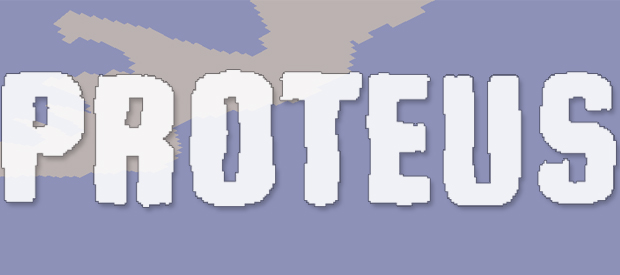This article may contain spoilers you’ll regret reading. It’s hard to say, really, but if you’re worried about tarnishing your experience—as can happen with any article about any game—consider playing the game on the fact that I’m saying, right now, that it’s worth your time. Otherwise, enjoy the words.
Before a few days ago, I had never heard the word Proteus. Now I’m having trouble getting it out of my head. This has happened before with other peculiar words like Thanatopsis, Agamemnon, and Ozymandias, but never before has a word stuck with me quite so pointedly. Proteus, it turns out, is a Greek sea god, but more importantly, it is the title of a new game by Ed Key and David Kananga that proves the definition of the word “game” is still expanding.
When you first enter the world of Proteus, you’re going to try to convince yourself and those around you that you’re not playing a video game. As you stand in the ocean—an island at the edge of your vision—you’ll be reminded of Minecraft, but beyond the 8-bit colorful style and first-person view, you’ll know that you’re not in Notch’s world anymore.
Realizing that you can’t move farther into the water, you’ll float toward the island. As the loading screen and other in-game text informs you, this unnamed land mass is randomly generated each time you start a new adventure, which is to say each time you play the game, as saving is not an option in Proteus.
Upon setting foot on the island, you will experience the game’s truest beauty—its music. Proteus’s soundtrack is made up entirely of environmental noise, with audio samples coming from the plants, animals, weather and land around you. It’s somewhat akin to a free-roam BitTripRunner without the jumping, sliding and general madness. Entirely organic, the blend of electronic and live-captured sounds coalesces into a symphony of enrapturing music. Simply put, if you play this game with headphones on, you might not realize how much time has passed once you finally manage to pull yourself away.
The game’s music is rivaled only by its visual design. Despite the 8-bit mainstays of jagged edges and indiscernible objects, Proteus is gorgeous. The island burst forth with brilliant hues and an encapsulating environment. In fact, the 8-bit restrictions make Proteus, rather than breaking it. “Is that a bunny I’m chasing?”” you’ll ask yourself, realizing only that it’s hopping and that you can’t seem to stop running after it. Flowers, trees and other living things come alive around you as you, the wandering wonderer, make your way across the island. (Words can hardly do the visuals justice, so I’ve attached the game’s launch trailer to this post. You’ll get the gist of what I’m talking about.)
For the first few minutes while you’re inside the world of Proteus, you’ll be convinced that this game is not actually a game. With no instructions and no real actions—other than, of course, movement—you’ll start to think to yourself “Alright, this is cool, but what the hell do I do?” To avoid spoiling this part of the experience, I won’t tell you. I will, however, reveal that you’ll see the world change in front of you, and that this change is part of the endgame. Nevertheless—other than to be called a “game” instead of an “interactive experience”—Proteus could stand on its own without a directive. The island envelops its visitors with the kind of audio-visual stimulation that shatters the divide between the real and virtual worlds.
Like TheGameCompany’s 2012 hit Journey, Proteus is not a game that spells things out for you. While you’ll eventually be able to figure out what’s going on and what you’re supposed to do, you won’t know what it means even, perhaps, by the time you finish the “story.” Embrace this fact. As with Journey, Proteus will stay with you long after you’re returned to the game’s menu screen at its conclusion. Is it a game you need to buy? Maybe not. I’d be surprised if it becomes a title that everyone plays and talks about. But if you’re the kind of gamer who thrives on new experiences, give Proteus a chance. You’ll be glad you did.
[youtube id=”rpkpuoq6y9s” width=”620″ height=”360″]
Proteus was developed and published by Ed Key and David Kananga. A digital copy of the game was provided by the publisher for the purposes of this feature.




